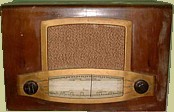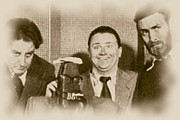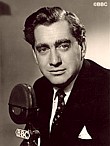.....................Je l'ai entendu à la Radio dans les années 50
| In
the 50's there was no television of course, but we did have the record
player and the radio. It was just the same really except that for the
images, you made them yourself in your head. But was that a
disadvantage really? Well perhaps it was, or perhaps not. Don't forget we did have the cinema! So we did have some images and we had comics! There was a lot of excitement here. I'll talk about all that another time. There's no hurry after all! For the little ones, like myself, there was 'Listen with mother' on the BBC Light Programme. Then, when we were at school, there were the BBC School broadcasts. But I can't remember what the programmes were about( I've a feeling there were some traditional songs, folk music we would say today). I can't find anything much on the Internet! After school in the evenings, we got together in a neighbour's house to listen to 'The Goon Show', 'Hancock's Half Hour' or 'Journey into Space'. There were always plenty of 'light' music programmes. Who can forget 'Friday night is music night' live from Blackpool tower with Reginald Dixon on the organ? The BBC had their own orchestras; there were a lot of orchestral programmes. Who could imagine 'Worker's Playtime' now, and of course the twice daily 'Music while you work' broadcast live into the factories to boost production. In those days we had the BBC Home service, the BBC Light and the Third programme. These were national programmes although Wales, Northern Ireland and Wales had their variants. The frequencies were on the medium et long wavebands. In the evenings on the medium waves, most teenagers would listen to Radio Luxembourg, 208, which transmitted pop music in English. At that time it was more modern than the BBC and they had commercials and jingles!!! But reception would be rather difficult and there was frequent fading. Then later in 1964 there was the beginning of Radio Caroline, a pirate radio station. This was the beginning of the end for the BBC monopoly, and with the increasing use of the FM transmitters, which carried a smaller distance, local commercial radio became possible in 1973. I remember those bbc stereophonic experiments in the late 50's on Saturday mornings. One channel was provided by the MW programme and the other by the bbc tv sound channel. The results were not really conclusive but it was great to participate in the progress of radio. Regular FM stereo transmissions began on the Third programme in 1962. At work we all built FM stereo tuners from a circuit out of Wireless world, I seem to remember! But that's another story..... |
|
Pendant
les années 50, il n'y avait pas de télévision bien
sûr, mais il y avait le tourne-disque et la radio. C'était
pareil sauf qu'on faisait les images nous-même dans nos
têtes. Est-ce que c'était vraiment un inconvénient? Bien peut-être que oui ou bien peut-être que non. N'oublions pas qu'il y avait le cinéma! Donc, il y avait des images, et il y avait des comics! Là il y avait beaucoup d'excitation. J'en parlerai une autre fois, après tout il n'y a pas le feu! Pour les tout petits, comme moi à l'époque, il y avait une émission qui s'appelait 'Listen with mother' sur le canal de la BBC 'Light Programme'. Et puis à l'école, il y avait le service radio scolaire de la BBC. Je m'ensouviens plus du contenu des émissions; de la musique folklorique, peut être. Il n'y a pas grande chose sur l'Internet à ce sujet! En rentrant de l'école, nous nous rassemblions autour de la TSF chez un voisin pour écouter 'The Goon Show' , 'Voyage dans l'espace', ou 'Hancock's Half Hour'. Il y avait toujours plein d'émissions de musique légère. Qui pourrait oublier l'organiste Reginald Dixon qui présentait son émission phare en direct de la tour de Blackpool, 'Friday Night is Music Night'? La BBC avait plusieurs orchestres; il y avait beaucoup d'émissions de musique. Les émissions comme 'Worker's Playtime' ou 'Music While you Work', faites pour augmenter le rendement après la guerre, seraient difficilement imaginable maintenant! A l'époque, la BBC avait 3 canaux de radio, Home, Light et Third. Ces canaux étaient nationaux mais il y avait des variants pour Le Pays de Galle, l'Irlande du nord et l'écosse. Les fréquences étaient sur les Petits Ondes et Ondes Longues. En soirée les adolescents, comme moi, écoutaient Radio Luxembourg sur 208 m, des émissions de musique 'pop' anglaise intercalé avec des jingles et de la publicité, le tout en langue anglaise. On l'adorait!!! La réception n'était pas facile. En 1964 il y avait la première station de radio 'pirate', Radio Caroline, qui sonnait le glas du monopole de la BBC. Les émissions se faisaient de plus en plus sur les bandes FM. A cause de la faible portée de ces émetteurs, en 1973, la radio locale commerciale devenait faisable. J'ai le souvenir, dans les années 50, des expériences sur la radio stéréophonique conduites par la BBC les samedis matins: un canal par la radio OC normale et l'autre canal par la télévision. Les résultats n'étaient pas vraiment évidents mais j'avais le plaisir de participer dans la modernisation et le progrès technique. Les émissions en stéréo ont débuté en 1962 sur 'The Third Programme'. Au travail, tout le monde construisait des tuners FM stéréo, mais c'est une autre histoire.... |
| Back to the Home page | Retour à la page d'Accueil |
http://www.radiorewind.co.uk/radio2/light_programme_page.htm
http://www.vintage-radio.net/forum/showthread.php?t=7397
http://www.theblackpooltower.co.uk/facts.htm
http://www.whirligig-tv.co.uk/radio/musicprog.htm
http://www.whirligig-tv.co.uk/radio/mwyw.htm
http://www.arar93.dsl.pipex.com/mds975/content/ukradio2.html
http://www.thegoonshow.net/ , http://www.archive.org/details/Goon_Show
http://www.jeton.themoon.co.uk/ , http://www.archive.org/details/JourneyIntoSpaceOTRKIBM
http://www.arar93.dsl.pipex.com/mds975/Content/ukradio2.html
http://en.wikipedia.org/wiki/Stereophonic_sound
http://www.rtl208.com/
http://www.vintage-radio.com/index.html
http://www.tonyhancock.org.uk/
http://www.televisionheaven.co.uk/hancock.htm




